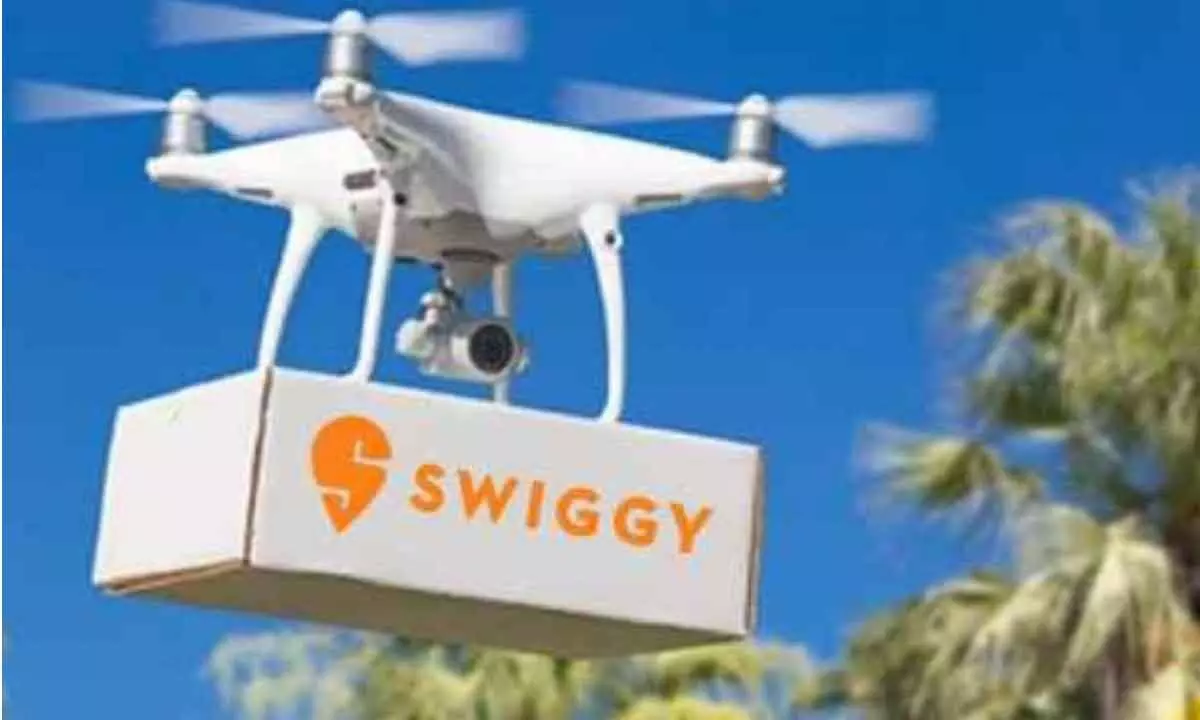Indian drone industry set to revolutionise logistics industry
Despite challenges, India's drone delivery service industry could lead to mushrooming of new shoots in the economy and the creation of new areas of employment
image for illustrative purpose

In the last decade, drones have transformed from a toy for hobbyists, aerial cameras for video and picture enthusiasts, and military hardware used by governments for carrying out surveillance and security, to dropping bombs. This air mobility vehicle will dawn a new role as the neighbourhood delivery vehicle for point-to-point logistics when Swiggy starts its replenishment service between its "dark stores" using drones.
Swiggy in India is the first of the block to deploying drones to back its "instamart service", thus making its first company to use aerial delivery service for neighbourhood logistics. Instamart, an online food-delivery platform of Swiggy, will "commence its pilot project in the National Capital Region - Delhi and Bengaluru, to deliver groceries between store-to-stores within the seller's network."
To launch first of its kind project, the company has chosen four drone startups, namely Garuda Aerospace, Skyeair Mobility, ANRA+TechEagle Consortia, and Hyderabad-based Marut Dronetech.
Swiggy, in its blog post, said the pilot project is to "evaluate the feasibility of drones for the middle mile use case, particularly for Swiggy's grocery delivery service Instamart. Drones will be used to replenish stocks between seller-run dark stores and from a store to a common customer point. A delivery partner will then pick up orders from the common point and deliver them to the customer's doorstep."
According to Prem Kumar Vislawath, Founder of Marut Dronetech, "it is one of a kind partnership which will optimise the entire delivery ecosystem and make deliveries faster, safer" and more "reliable."
However, Prem feels the launch of Beyond Visual Line of Sight (BVLOS) flights by Swiggy, where drones operate up to 20-km range, would have surprised many industry "consultants" and planners. The industry observers did not expect India to allow BVLOS flights this soon. Nonetheless, this Swiggy's initiative will encourage private players from other industries to use drones in BVLOS flights, thereby galvanising the drone business in the country.
When the Drone industry fully matures, which could be about at least a decade away, it will not just create thousands of jobs in usual areas such as operations, administration and business development. The industry would also give birth to new jobs such as drone pilots, maintenance crews, drone designers, safety inspectors etc.
In addition, the emerging sector will also influence education institutions to offer new customised courses, real estate developers to bring up infrastructure that supports landing, housing, maintenance and training of drones and technology companies will mushroom across the country that provides support services or solutions.
Drones are currently being used in a limited role of delivering emergency medical supplies across the globe. However, India's initiative to deploy commercial drones in neighbourhood logistic roles can make it a market leader in the sector. India as a country is leading the way and showing the path to the world in multiple areas, including the adoption of fintech across industries.
The use of Drone in BVLOS flight could be the next frontier to conquer for Indian companies. According to Prem, his drone startup has "completed more than 1000 BVLOS flights with 1000s of hours of experience", and it "intend to use that learning curve to make the delivery operation as a unique and in seamless manner."
India has hundreds of drone companies operating across the country; Swiggy alone received "registrations from 345 players for its request for proposal (RFP) for the drone delivery service." In May, when Instamart starts to deliver groceries using drones, it will galvanise hundreds of new entrepreneurs to jump into the 'delivery by drone' race.
However, some challenges need to be fixed for the industry to grow. First and foremost is to manufacture critical components, such as batteries, propellers and motors, within the country, which will reduce costs across the industry spectrum, making the service viable. There is a need to build capacity to include training drone pilots and maintenance and logistics staff.
According to Kumar, most drone deliveries thus far were carried out in remote areas; therefore, companies did not experience the challenges that city operations could throw. Thus, the Swiggy grocery like services for Urban India will encounter unique challenges. For example, reaching a city address within 10 meters accuracy is impossible even today. We experience that every day with drivers or delivery boys. Further, the low hanging and dense powerlines and cables would pose a safety hazard. Thus, all stakeholders, including governments, will have to be agile when it comes to rules and infrastructure changes so that it does not hamper the services from expanding to new geographies and industries.
(The author is Founder, MyStartup TV)

